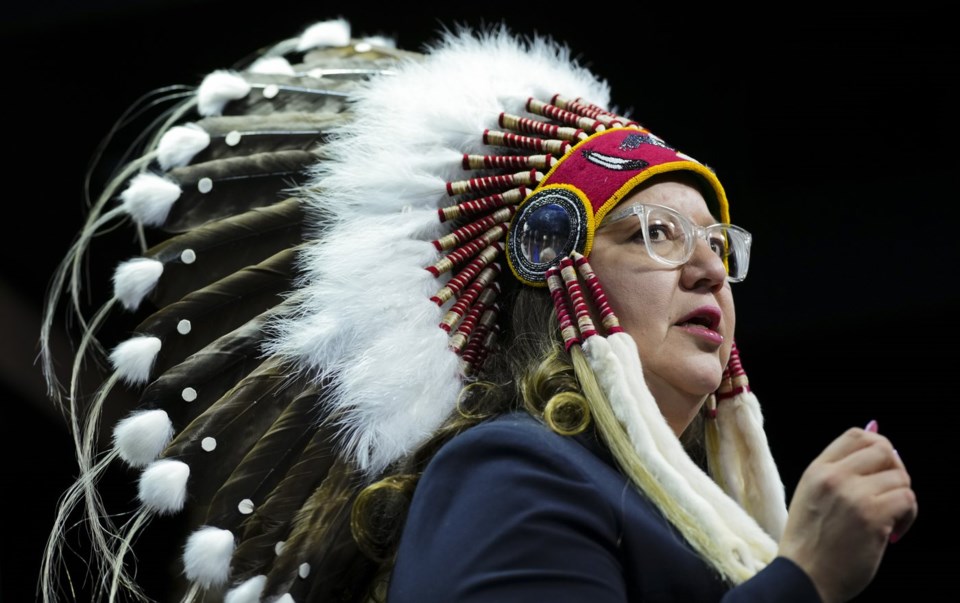WINNIPEG — Parliamentarians chided Prime Minister Mark Carney's Liberal government during the Assembly of First Nations' annual general meeting, saying his government is using tense times with the United States to step on their rights in his bid to push major projects forward.
"This total disregard of our inherent and treaty rights became clear when the prime minister provided just seven days to review and comment on a summary of this legislation, and then refused to slow down the process when (AFN National Chief Cindy Woodhouse Nepinak) called on the Liberals to do so during the committee review of Bill C-5," NDP member of Parliament Leah Gazan told the hundreds of chiefs gathered in Winnipeg.
"This normalized colonial behaviour made it clear to me, and many others, that they are not willing to participate in meaningful discussions, let alone fulfil their constitutional obligation to consultation."
Gazan was speaking about Carney's signature major projects legislation that allows the federal cabinet to fast-track projects deemed to be in the national interest — an effort to shore up the economy in the face of U.S. President Donald Trump's tariffs.
The law has seen strong opposition from some First Nations leaders and community members who fear it will infringe on their inherent treaty rights.
Gazan likened the government's push to residential schools. "Instead of violently stealing our children, they are aggressively pursuing access to our lands, territories and resources, violating our sovereignty."
Bloc Québécois MP Sébastien Lemire similarly called out Ottawa, saying the inclusion of the Indian Act in the first draft of the legislation would have caused a constitutional crisis.
The Indian Act was removed from the list of laws the federal government can overstep during the committee process.
The three-day assembly is expected to focus heavily on the major projects legislation, as it's the first time all chiefs have gathered since the bill passed in June. Chiefs are expected to vote on resolutions about the bill Thursday.
First Nations leaders warned government those projects won't move forward without First Nations at the table.
"We can all agree on this, that progress cannot come at the cost of our rights, our treaties or our responsibilities to the land," Assembly of Manitoba Chiefs Grand Chief Kyra Wilson said.
“Anything that we do in this country will not be at the expense of our lands, our waters and our resources. For generations, decisions have been made without us, while the impacts fall on our nations and our families.”
In her opening remarks, Woodhouse Nepinak pointed to provincial bills that also seek to fast-track projects. She praised chiefs in British Columbia, Quebec and Alberta for standing up for their rights and territories by pushing back against provincial governments.
"Alberta chiefs were the first earlier this year to stand up to (Premier Danielle Smith's) threat to separate from Canada, as if she had land to take," Woodhouse Nepinak said.
Carney held summits with First Nations, Inuit and Métis leaders about the major projects bill. First Nations chiefs left those July meetings with mixed opinions on the way forward.
Gazan called the meetings a "national disinformation tour," where Carney and his ministers attempted to reassure that the rights of Indigenous Peoples would be protected.
Woodhouse Nepinak has said the assembly would hear a range of views from First Nations leaders — with some supporting the major projects push and others reluctant or saying they lack information.
One draft resolution calls for First Nations infrastructure ventures to be included in the push for projects.
The assembly recently put forth a pre-budget submission to Ottawa calling for $800 million over two years to support a First Nations review of national interest projects.
Other topics expected include child welfare reform, the repatriation of artifacts from around the world, policing, the toxic drug crisis and closing the First Nations infrastructure gap.
The AFN said 311 chiefs and proxies registered for the meeting, with 34 attending virtually.
Crown-Indigenous Relations Minister Rebecca Alty tried to quell concerns about the major projects legislation in her address to the assembly, saying a strong economy permits investments in social priorities like hospitals, schools and roads.
She said the government's goal is to build resilient economies in partnership with First Nations.
"Nation-building must be grounded in real equity and shared stewardship of resources, not as a lofty ideal, but as a fundamental principle," Alty said during her first address to the AFN since being elected in the spring.
"While we have made important progress, I'll be the first to say there's much more work to be done as we walk the path of reconciliation together. I look forward to continuing this work with you, guided by respect, partnership and shared purpose."
Some chiefs have expressed concern about potential cuts to federal spending, as Carney has asked his ministers to find savings in their department budgets.
Carney was asked about cuts Wednesday while speaking to reporters in Toronto. His response was similar to Alty's argument about shoring up the economy to ensure programs can be funded.
He said the Indigenous Advisory Council, which is to work with the new federal Major Projects Office, would be announced next week.
Manitoba Premier Wab Kinew hinted at his government's approach to major projects in his address to the assembly.
"Real nation-building involves the First Nations of this land," said Kinew. "We're showing up to talk to the Indigenous leaders first."
Manitoba has proposed a Crown-Indigenous corporation to work with First Nations and Red River Métis on developing frameworks for major infrastructure projects. The initiative has been greeted with cautious optimism by various Indigenous groups.
This report by The Canadian Press was first published Sept. 3, 2025.
— With files from Alessia Passafiume in Ottawa
Brittany Hobson, The Canadian Press




